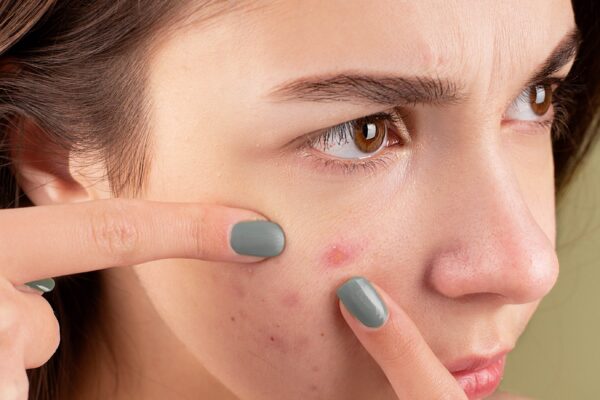Exploring Acne: Understanding Causes, Treatment, and Management
Acne
September 1, 2023
Acne isn't just about occasional zits; it's a complex skin condition that involves much more than meets the eye. It emerges when hair follicles, those tiny openings in your skin that house hair and oil glands, become clogged with a mix of oil, dead skin cells, and bacteria. The result? Pimples, blackheads, whiteheads—these unwelcome guests can appear anywhere on your body, with the face, chest, and back being the most common battlegrounds.

Acne, an often-uninvited guest, has the knack of showing up just when you least expect it. To help you navigate through this skin journey, we’re here to provide you with comprehensive insights into what acne is, how it develops, and most importantly, how you can effectively manage it.
What is Acne?
Acne isn’t just about occasional zits; it’s a complex skin condition that involves much more than meets the eye. It emerges when hair follicles, those tiny openings in your skin that house hair and oil glands, become clogged with a mix of oil, dead skin cells, and bacteria. The result? Pimples, blackheads, whiteheads—these unwelcome guests can appear anywhere on your body, with the face, chest, and back being the most common battlegrounds.
How does Acne develop?
The tale of acne unfolds when your body’s natural oil production goes slightly overboard. This oil, known as sebum, usually helps keep your skin healthy and hydrated. However, when an excess of sebum combines with dead skin cells and bacteria, it forms a perfect recipe for clogged pores. Hormonal changes, such as those experienced during puberty or menstruation, can supercharge oil production and make you more susceptible to acne. Genetics, diet, and certain medications can also play a role.
How is Acne treated?
Addressing acne requires a personalized approach, recognizing that its severity can vary significantly from person to person. For those with mild cases, adopting a consistent and gentle skincare regimen is key. Regularly cleansing your face with a mild cleanser and using non-comedogenic moisturizers can go a long way. Remember, while it might be tempting, avoid the urge to scrub your face vigorously—gentleness is your skin’s best friend.
Over-the-counter topical treatments containing active ingredients like benzoyl peroxide or salicylic acid can be valuable tools in your arsenal. They work by exfoliating the skin and reducing the buildup of dead cells, effectively preventing clogs. However, for persistent or more severe cases, seeking guidance from a dermatologist is highly recommended.
Our experienced Doxtors can assess your specific condition, determining whether prescription medications are necessary. These might include topical retinoids, which help unclog pores and regulate cell turnover, or antibiotics to tackle the bacterial component. In certain instances, oral contraceptives may be suggested for females, particularly when hormonal factors are at play.
For the most severe cases, the powerful medication isotretinoin, often known by its brand name Accutane, could be considered. This treatment comes with potential side effects and requires careful monitoring, but it has shown remarkable results in many individuals.
In Conclusion
Acne, while frustrating, is a condition with solutions. At our clinic, we understand that each skin journey is unique. We are well-equipped to guide you through the process, tailoring recommendations to your specific needs. Whether through gentle skincare adjustments, over-the-counter treatments, or advanced prescription strategies, we’re committed to helping you achieve clearer, healthier skin.
References
- American Academy of Dermatology Association. (n.d.). Acne. Retrieved from [https://www.aad.org/public/diseases/acne](https://www.aad.org/public/diseases/acne)
- Mayo Clinic. (2021). Acne. Retrieved from [https://www.mayoclinic.org/diseases-conditions/acne/symptoms-causes/syc-20368047](https://www.mayoclinic.org/diseases-conditions/acne/symptoms-causes/syc-20368047)
Recent Post

Lorem ipsum dolor sit amet, consectetur adipiscing elit. Quisque pharetra condimentum.
Quick Links
Copyright © 2021 UNQ Design

